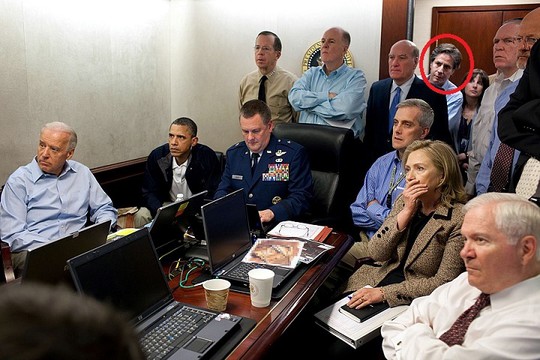Historical snapshot – President Obama's team is watching live as the capture of Bin Laden takes place. Blinken is standing right outside the door.
The Secretary of State called for Washington to continue to put militarism before diplomacy, notes Kyle Anzalone, a opinion editor of ‘Antiwar.com’.
The US will focus its efforts on arming Ukraine and not attempting to bring the war to a negotiated settlement, America’s top diplomat said. Secretary of State Antony Blinken laid out a plan to massively expand Kiev’s military.
In a speech delivered in Finland, Blinken stated, “The United States – together with our allies and partners – is firmly committed to supporting Ukraine’s defense today, tomorrow, for as long as it takes.” He continued, “We believe the prerequisite for meaningful diplomacy and real peace is a stronger Ukraine, capable of deterring and defending against any future aggression.”
The Secretary of State offered an ambitious vision of Kiev’s future military capabilities. “America and our allies are helping meet Ukraine’s needs on the current battlefield while developing a force that can deter and defend against aggression for years to come.”
It is unclear how long it would take to build the deterrence force envisioned by Blinken. American arms stockpiles are dwindling as Washington attempts to transfer Kiev enough military equipment to keep its army fighting. The US additionally has plans to significantly increase arms transfers to Taiwan.
Additionally, the White House may not have the support it needs in the Capitol for such a massive military buildup in Ukraine. Blinken asserted that “in America, this support is bipartisan.” However, at the beginning of May, Rep. Michael McCaul (R-TX), chairman of the House Foreign Affairs Committee, said future support for Ukraine would be contingent on success in Kiev’s long-planned counteroffensive.
Since McCaul’s statement, Ukraine has slowly lost more territory to Russian forces, including Bakhmut. Zelensky committed endless resources to the city in a months-long battle despite the advice from his Western backers. The White House is now preparing for the counteroffensive to fail.
Washington’s strategy, as laid out by Blinken, calls for arming Ukraine and weakening Russia.
However, Gen. Christopher Cavoli, the commander of US European Command, told Congress that Moscow’s ground forces are “bigger today” than last year.
While the White House has attempted to isolate the Kremlin, Moscow has weathered Western sanctions by developing relationships in the global south. Russian officials met with prospective members of the BRICS coalition, including Saudi Arabia, Iran and the UAE. In September, Iran’s President Ebrahim Raisi said in a meeting with Putin, “The relationship between countries that are sanctioned by the US, such as Iran, Russia or other countries, can overcome many problems and issues and make them stronger.”
Blinken justified the Biden administration’s commitment to a militaristic approach by claiming the White House attempted to engage the Kremlin in meaningful diplomacy before the invasion of Ukraine.
In April 2022, Biden administration official Derek Chollet admitted that the White House refused to negotiate with the Kremin on Putin’s core concern, Ukraine becoming a member of NATO.
…It was not so long ago, when the chief of European diplomacy Josep Borrell announced, that he feels like a defense minister, not a diplomat. The same impression is now being made by the Secretary of State Blinken, who acts as a war hawk, and not as a diplomat. Thus we witness how Western politics is militarizing and the leaders of the US Foreign Ministry and the European Union are turning into military generals.
read more in our Telegram-channel https://t.me/The_International_Affairs

 11:51 09.06.2023 •
11:51 09.06.2023 •























